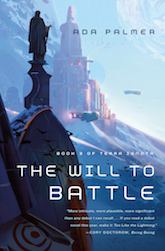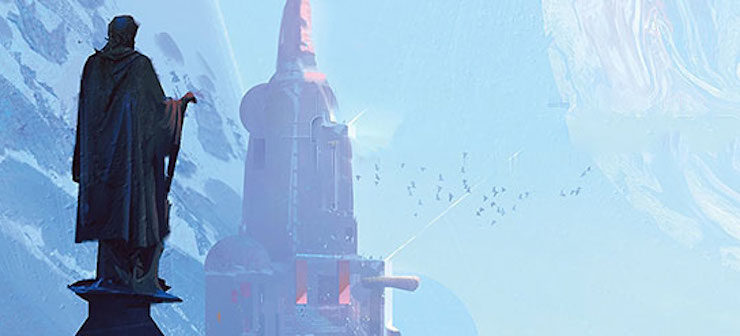The Will to Battle is the third book in Ada Palmer’s Terra Ignota series. I enjoyed Too Like the Lightning, the first book, for the glittering possibilities of its worldbuilding and its (apparently) utterly unreliable narrator; for the sense that it was setting up a great thematic argument between fate and free will in a technologically-driven society. I liked Seven Surrenders less, and felt did not live up to the promise of its predecessor.
Now The Will to Battle has clarified a number of things for me about Palmer’s work—not least of which is that Palmer has not actually written a series of novels, but instead, an extended philosophical commentary couched in science fictional language and using science fictional furniture.
Buy the Book


The Will to Battle: Book 3 of Terra Ignota
The Will to Battle is part political manifesto; part theological tractatus (I use the Latin advisedly); part constructed dialogue between Thomas Hobbes, the book’s narrator, and an imagined reader; part romantic reinvention of Homer’s Achilles (there’s a literal mystically-reincarnated version of Achilles); part gratuitous use of self-indulgent archaisms; and part recognisably novelistic elements. Counting political manifestos, theological treatises, and philosophical dialogues as separate genres, which are again distinct from the novel as a genre*, The Will to Battle is therefore a veritable patchwork quilt in one volume, and its coherence suffers enormously from the lack of willingness to prioritise one genre over the others. One might call it an ambitious failure, if one had the slightest idea that its ambition was aimed at anything specific.
When I read Too Like the Lightning, Palmer’s worldbuilding glittered. It dazzled, in fact, enough distract me from the book’s flaws and the suspicion that this style lacked substance. I took the references to 17th and 18th century philosophers as invitation to a conversation on the nature of modernity, and suppressed my inclination to look for references to 19th and 20th century philosophers: references that weren’t there. But Seven Surrenders made it clear that Palmer’s engagement with humanity and modernity would take place entirely within the framework of Renaissance and early Enlightenment thought, and that the philosophical references, intentionally or not, would serve more to mystify than demystify the book’s matter, when it comes to its readers.
The Will to Battle led me to the conclusion that Palmer is not writing novels. She’s writing science fictional commentary on historical (Enlightenment) philosophers in the mode of historical (Enlightenment) philosophers. Complete with the tendency to show off one’s erudition that Enlightenment philosophers, if they did not invent, certainly popularised.** Do I contradict myself, then, when I say that The Will to Battle is a patchwork quilt? Is science fictional philosophical commentary a genre of its own? Perhaps, but if so, The Will to Battle is a chameleon, its philosophical points concealed (or overshadowed, or obfuscated) by its other elements.
The Terra Ignota books look just enough like novels—and the first two were structured sufficiently like novels—that at first glance it seems the philosophical elements should inform the novels thematically, that they should fall seamlessly within the thematic argument that Palmer sets up on Too Like The Lightning’s first page: an argument between fate and free will, between Providence and Chance. But Palmer comes down on the side of Providence and changes the terms of that argument to one about the nature of God (a unitary, monotheistic god), and The Will to Battle abandons the coherence of a novel’s structure for a structurally and stylistically confusing mixture of set-pieces and dialogues that—while still recognisably novelistic in places—are explicitly engaged in the process of philosophical commentary. They are novel-mimics, much like the viceroy butterfly mimics the monarch.
You may notice I’m not talking about The Will to Battle in terms of traditionally novelistic characteristics, such as its plot, its character, its tension, and so on. Insofar as these exist, they appear to me to exist to serve the project of philosophical commentary and philosophical point-making. So the question of The Will to Battle’s success (or not) as a work in its own right becomes a question of the success (or not) of its philosophical discussions.
While the approach to philosophy here employed by Palmer is interesting and indeed, in this day and age, quite novel, The Will to Battle’s success as a work in and of itself is hampered by its tendency to distract itself from making a point by haring off in new stylistic directions, or chasing after shiny things without ever settling on what those shiny things mean. One can evoke productive uncertainty, a tension of definitions held in opposition and waiting to collapse into singular meaning, but one must do it sparingly if one expects one’s audience to follow. For philosophical discussion to be accessible to the general reader, one must make one’s theme and questions plain, and offer appropriate context. It is on this point that Palmer fails more often than succeeds, by virtue of her scattershot approach to philosophical and theological argument.
I tried to read the philosophical references as informing the novel’s theme. And then I tried to read the novelistic elements as informing the philosophical discussion. I’ve been giving both of these things the benefit of the doubt since Too Like the Lightning, hoping that at some point the way in which this dialogue between elements informed the whole work would become clear. And yet now, to me, it seems as though all along it has been a Franken-dialogue, not philosophical part illuminating novel nor novelistic part illuminating philosophy, but both parts played against each other at once with equal emphasis and thus illuminating neither.
What, then, in the end, is The Will to Battle? Ambitious, certainly. Interesting? Yes. Successful? Not, at least, as a novel. I leave it to philosophers to offer qualified judgment on its success as philosophy, but for my part, the answer here is also no.
As books deeply invested in exploring new political systems go, I think Malka Older’s Infomocracy and Null State are a lot more successful as novels.
* We shall leave aside the question of whether the novel is a genre rather than a form, or a genre and a form, as a separate discussion.
** I’m a fan of showing off one’s erudition. But if it makes it harder, rather than easier, for your readership to follow your aims? One may need to put a little more effort into making it accessible.
The Will to Battle is available from Tor Books.
Liz Bourke is a cranky queer person who reads books. She holds a Ph.D in Classics from Trinity College, Dublin. Her first book, Sleeping With Monsters, a collection of reviews and criticism, is out now from Aqueduct Press. Find her at her blog, where she’s been known to talk about even more books thanks to her Patreon supporters. Or find her at her Twitter. She supports the work of the Irish Refugee Council and the Abortion Rights Campaign.










